PHP and Node.js are two widely used backend technologies that power web applications. PHP is older than Node.js, so it naturally has a larger community and significant projects in its kitty.
On the other hand, Node.js successfully builds a strong user base across projects meant for modern-day use cases. Both technologies were introduced at different times and in tech climates, but some similarities exist. For instance, both are open source and have a substantial supporting community.
Given their intertwining nature and significant differences, choosing the right technology is crucial but complicated. It impacts time-to-market, resource utilization, product performance, budget, etc.
In this blog post, we will walk you through a detailed comparison of Node.js vs PHP and help you determine what you should use for your project.
Comparison Overview: Node.js vs PHP
Node.js has the advantage of being faster due to its event-driven architecture and non-blocking I/O model. However, PHP has a faster startup time and lower memory footprint, making it suitable for projects with limited resources. Both technologies have distinct features, pros, and cons. So here’s a quick comparative look at Node.js vs PHP.
| Differentiators | Node.Js | PHP |
| Coding | Requires more lines of code | Needs fewer lines of code |
| Speed | Offers higher speed than PHP | Slower than Node.js |
| Performance | Provides high application performance | Not as performant as Node.Js |
| Modules | Smaller library of modules but it is being updated rapidly | Bigger library of modules |
| Frameworks | A smaller number of frameworks but they are easy to use and boost productivity | A massive list of frameworks, but choosing the right framework can be time-consuming |
| Database prowess | Works well with SQL and No SQL databases | Works well with traditional databases such as MySQL and PostgreSQL |
| Request handling | Efficient request handling due to non-blocking I/O | Offers request handling but takes more time |
What is Node.js?
Node.js is a cross-platform open-source runtime environment that runs on Chrome’s V8 JavaScript engine. It allows developers to build server-side applications in JavaScript and comes with built-in modules to create web servers, handle HTTP requests, perform I/O operations, and much more.
In other words, it offers full-stack capabilities to build robust web applications.
Some of the key features of Node.js include its event-driven, non-blocking I/O model, which allows it to handle large numbers of simultaneous connections. It also provides a powerful set of tools for debugging and profiling applications.
Node.js is a widely used technology for backend development, and the numbers below shed light on the space it has carved for itself in the market:
- Node.js is one of the most used frameworks by software developers worldwide.
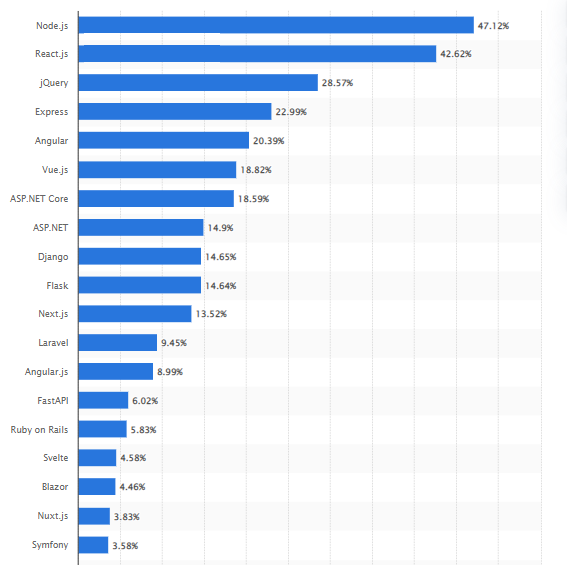
- Node.Js is used by 2% of all websites, which is a total of 30 million sites across the world.
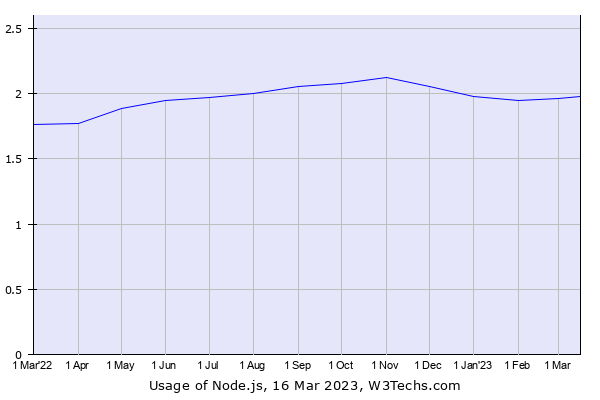
Use cases of Node.js
- Streaming and social networking apps
- Data-intensive, dynamic software
- Single page applications(SPAs)
- IoT-based applications
- ECommerce applications
- Enterprise-grade software
Popular apps using Node.js as backend technology
- NASA used Node.js for the backend and migrated to a cloud database to create a single database for each query.
- Twitter used Node.Js to develop and deploy Twitter Lite with a 30% faster time-to-market.
- Netflix decreased app startup time from 40 minutes to 60 seconds by migrating from Java to Node.js.
Pros of Node.js
- Unopinionated Node.js builds everything from scratch with fewer restrictions, which gives developers the freedom to code their own way.
- Non-blocking event loop mechanism enables the server to process several requests simultaneously, resulting in higher scalability and faster performance.
- Active community facilitates access to readily available solutions and code that make it easy for startups and beginner developers.
- Full-stack privilege for developers as Node.js brings JavaScript capabilities on the server side too.
- Caching system caches single modules in the application memory and eliminates the need to re-execute the code for faster response times.
- Extensive support assists developers with commonly used tools for different purposes, such as testing or identifying project dependencies.
Cons of Node.js
- Since everything needs to be written from scratch, you may experience a decline in productivity.
- Although Node.js supports complex apps, it doesn’t fare well with heavy computing (CPU-intensive) apps.
- Due to nested callbacks in Node.js and its heavy reliance on asynchronicity, it becomes tedious to maintain and difficult to understand code.
- Some Node.js tools don’t match high-coding standards and are not correctly structured due to the open-source ecosystem.
What is PHP?
PHP is a scripting language for automating various server-side web development tasks. It is a general-purpose programming language that easily embeds with HTML codes. In contrast to Node.js, PHP is a synchronous language with a multi-threaded, blocking I/O mechanism.
Let’s look at how popular PHP is and how widely it is being used in the market
- PHP is one of the top 10 scripting languages with a 20.87% share, according to the StackOverflow Developer Survey 2022.

- About 5% of the total websites on the internet use PHP as a scripting language server-side programming language.
- WordPress fuels 43% of websites worldwide, making PHP a choice for 4 out of 10 sites.
- PHP is at the top of the global programming languages listwith a market share of 28.57%.
Use cases of PHP
- Customized websites
- Sites with extensive image processing needs
- Server-side scripting for websites
- Desktop (GUI) applications
Popular apps using PHP as the backend technology
- Facebook created a new PHP-driven language called Hack as a part of HipHop Virtual Machine (HHVM), an open-source JIT compilation virtual machine.
- WordPress uses PHP at its core and offers a host of themes, plugins, and template customizations through its software.
- Flickr uses a PHP base to offer image processing for photographers and upload high-quality pictures in a limited bandwidth.
- Etsy created an analyzer called Phan for PHP to identify false positives and reduce errors in server-side scripting.
Pros of PHP
- Pre-written scripts are ready-to-use code that saves development hours.
- It comes withCross-platform capabilities to support major operating systems, including Linux, Solaris, UNIX, macOS, and Windows.
- The learning curve is not steep with a consistent and logical syntax that shares similarities with C.
- The database connection is compatible with popular database services like MySQL or MariaDB and offers clutter-free data exchange
- High-speed boosts user engagement and SEO rankings by loading web pages faster without disruptions.
Cons of PHP
- Not enough debugging tools- Does not provide enough debugging tools, which can affect the performance of applications
- Lack of uniformity– Lack of uniformity in structural patterns of PHP frameworks can increase the cost of hiring new human resources.
Node.js vs PHP: Detailed Comparison
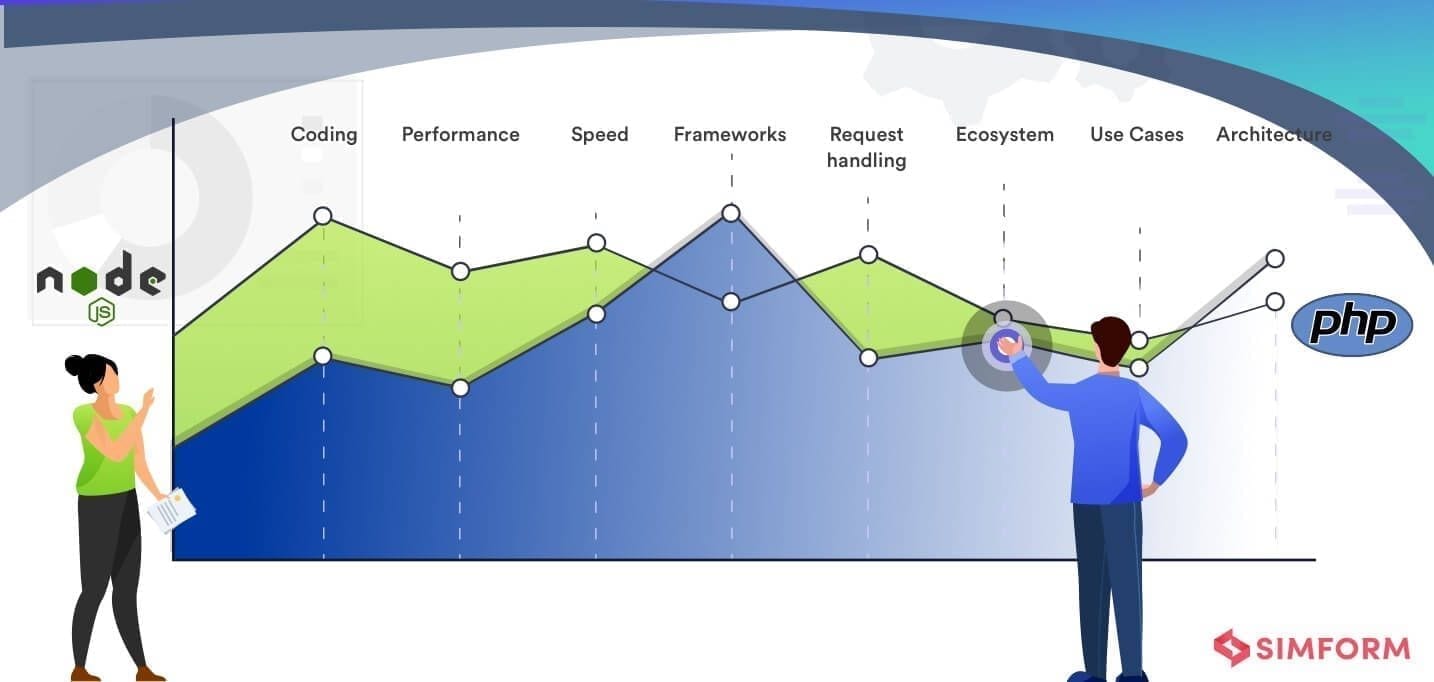
#1 Coding
If the syntax is easy and well engineered, you’ll be able to do more with less code.
Node.js
On the surface, it may seem that Node.js requires more lines of code to execute the same functions as PHP. Thankfully, you need not remember the syntax of different languages while coding because the entire development environment is programmed with Javascript. So Node.js may sometimes require relatively longer lines of code, but it operates with only one language.
PHP
PHP has been around for a while and has flourished significantly over the years. It may seem from afar that PHP requires lesser lines of code to perform a function and is thus easier. But then, you need to be fluent in how operators and generators work in Linux, Apache HTTP Server, MySQL, and PHP itself (commonly referred to as LAMP).
Simform Recommends
On a standalone basis, both languages are easily understood. It’d take no time for a rookie developer to attain proficiency in either language. However, Node.js is easier to execute despite its longer code thanks to its setup of just one programming language. So when coding is concerned, Node.js is a winner in our books.
#2 Client-Side Coding
Server-side coding focuses on the effective execution of functions that would eventually constitute the UI. This is a critical parameter since it largely determines the user-experience, data used on the client’s device, and page loading speeds of an app.
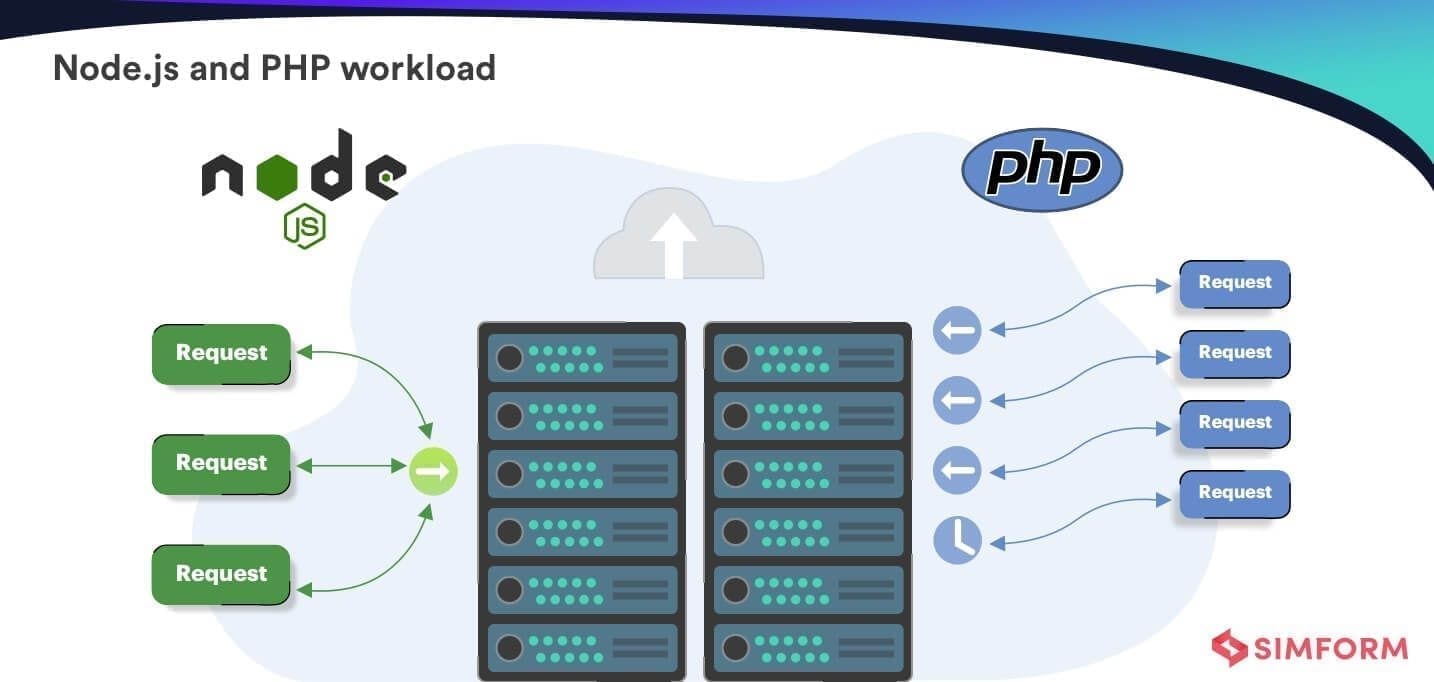
The key benefit of this development environment is that you can import all the logic of the backend code for the server-side code. It then becomes easy to access the features you have allocated on both fronts. Also, Node.js moves a lot of workload to the client side. So if your target audience has smartphones with decent processing power, Node.js is ideal for your use-case. However, it uses AJAX engine to create new web pages upon client requests, so it must be connected to the server consistently.
PHP
PHP was designed to maintain dynamic web-pages. Hence, several functionalities that you might need for UX elements of the web-page are already inbuilt.
Beyond that, PHP depends on the HTML code created for each static web page. Since there is no change necessary for each web-page, it easily loads the page without exerting stress on the processing power of client devices.
Simform Recommends
Both PHP and Node.js derive their value from the use-case you have in place. If your project has a static website requiring few client requests, and your target audience uses low-powered devices, PHP would be just what the doctor ordered.
But if your use-case includes dynamic websites frequently sending server-requests and has a dynamic UI, you want to go with Node.js.
#3 Speed
This metric refers to the execution speed inherent to both technologies. High speed of execution means a quicker development process and more cost-effective projects.
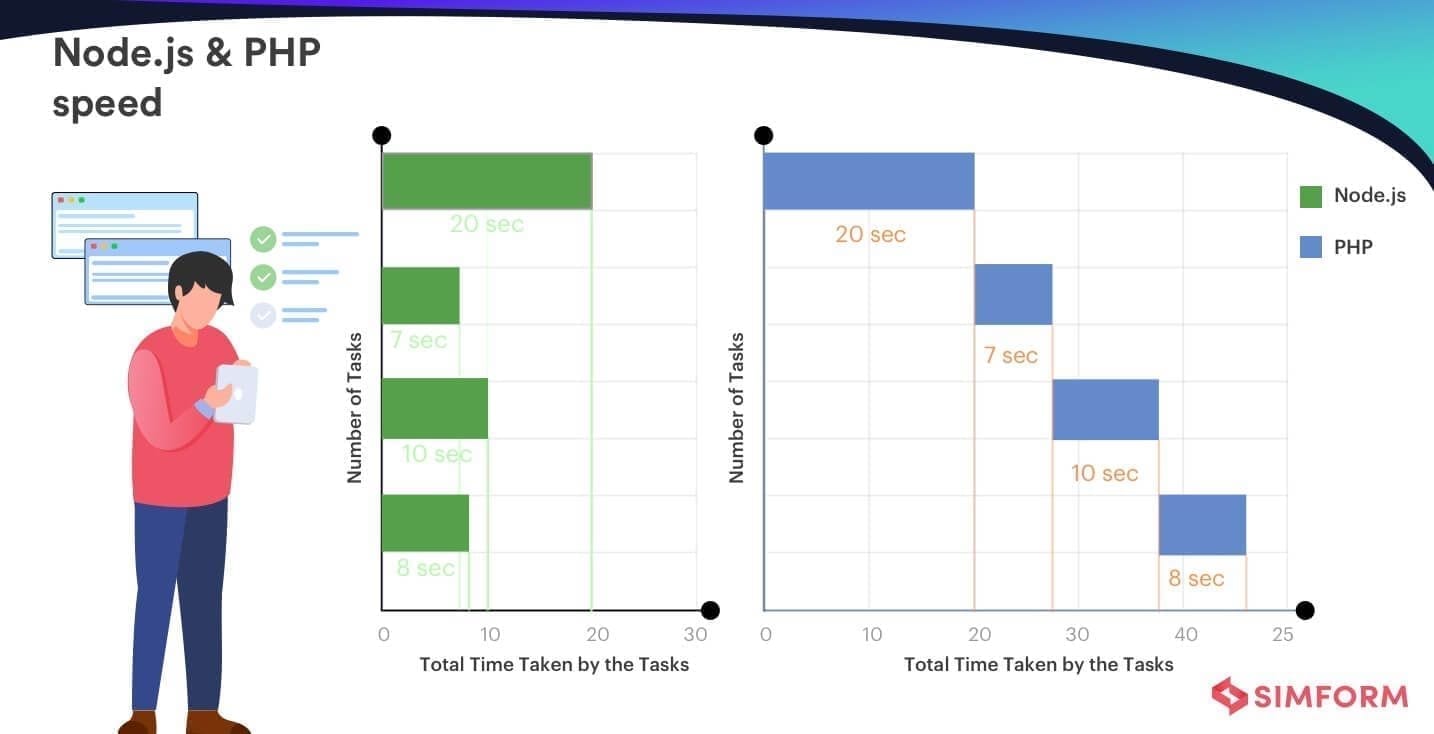
Node.js is among very few asynchronous development environments. This, being a major differentiator, gives Node.js an edge over other languages. Being asynchronous means that it need not wait for a module to be successfully executed before loading the next one. Such execution drastically reduces the downtime for the web app and makes for a seamless user experience.
PHP
Like most languages and technologies from the pre-2K era, PHP operates on synchronicity. That means every module and function is executed in the code-specified order. If one function or module is not executed, the consequential ones will not start until it’s completed.
Simform Recommends
Thanks to its asynchronous execution, Node.js is a clear winner owing to its speedy performance.
#4 Performance
Performance is the metric of how the code is written in PHP or Node.js and its performance on KPIs like page-loads and seamlessness. A high-performing technology means better results for your product’s performance using KPIs that have a deep impact on the UX.
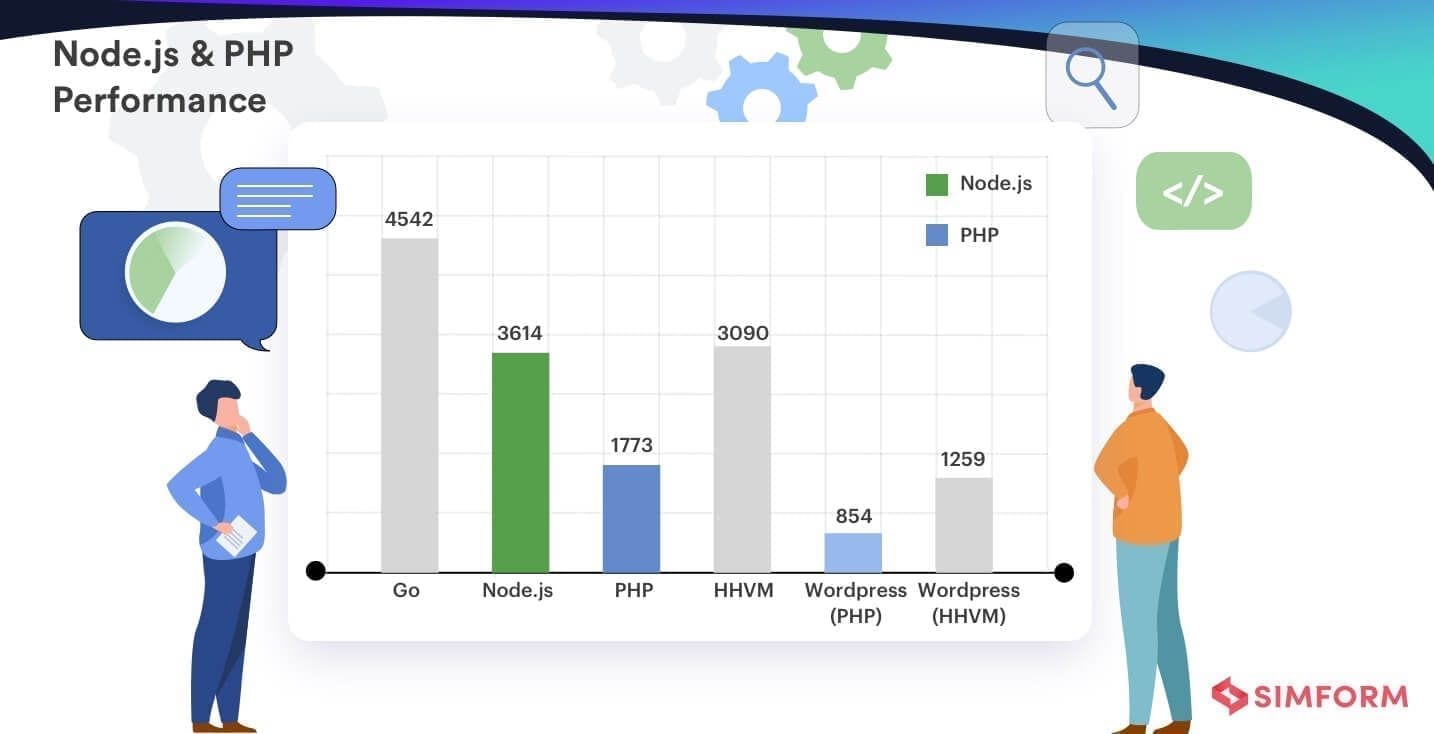
The asynchronous nature of Node.js with JavaScript V8 Engine gives Node.js a remarkable execution speed along with quick startup time. Since Node.js is event-driven, it doesn’t block requests to finish existing ones.
This order-independent execution is generally referred to as ‘concurrency’. Concurrent module execution means that multiple modules are executed at a given time but not simultaneously.
Simply put, their beginning and completion times may differ even if they’re using the same resource and executed in the same environment.
PHP
PHP was developed in a much earlier timeframe, and it shows in the way it performs on page-load time efficiency. It blocks a process till it’s been entirely calculated – which translates into slow loading with no scope for concurrency.
But If you still want to continue with PHP, you can pair it with HHVM Virtual Machine used to execute PHP web apps. It can boost the performance of your PHP web app by almost 75%. Even so, Node.js is still a faster alternative.
Simform Recommends
Both PHP and Node.js use Just-In-Time Compilation. However, if performance is high on your list of priority features, Node.js is hands down the tech that delivers.
#5 Frameworks
Frameworks help you focus on the fine details of your project as the most commonly used code is already provided with functions, libraries, and APIs. The more extensive the framework, the lesser the amount of redundant code you need to write.
Node.js
With frameworks like Meteor, Derby, Express, and Sails, Node.js has seen a massive expansion of its libraries in a relatively shorter period. While these frameworks can boost productivity reducing development time and resource consumption, PHP’s frameworks outnumber those of Node.js by a huge margin.
PHP
Around since 1995, PHP has a very rich library of frameworks with niche markets of their own. In fact, some development agencies focus specifically on forms of PHP frameworks like Laravel, CodeIgniter, CakePHP, and Phalcon.
Simform Recommends
While the list of PHP frameworks is long, there goes more nuance in deciding which technology performs better. Many PHP frameworks were engineered to import features like non-blocking which are inherent to Node.js. Besides, several PHP frameworks have one common issue – mixed content and code.
Since Node.js was developed in a time when demarcating code and content between modules became a norm, consistency is maintained across most of its frameworks keeping the code organized and interpretable.
Also, its most popular frameworks are developed on Javascript, which makes it easier for developers to maintain their backend and frontend logic of developing web applications.
Conclusively, Node.js will serve as a better choice if your project requires extensive use of frameworks.
#6 Database
Here, we’re examining how conveniently the technology is able to connect with the database along with the type of the database – relational or traditional. Conventional databases traditionally store data in a navigational or hierarchical format.
Relational databases store data in the form of tables; that way, it’s super convenient to understand the relationships and dependencies between different data points.
There’s also the remarkable development of NoSQL (Not Only SQL) databases that allow data storage in formats like documents, key-pairs, and even graphs.
NoSQL databases can store almost all forms of data structures including unstructured, semi-structured, and structured databases. With this, NoSQL databases are very developer friendly.
Node.js
Since Node.js has grown with the advent of NoSQL databases, it’s well-synchronized with all forms of databases. With Javascript Object Notation- a unique format of data used while interacting with databases- Node.js can work swimmingly with NoSQL databases like MongoDB and CouchDB.
It also supports graph databases and has substantial libraries to access SQL databases.
PHP
Being the older technoloy, PHP is designed to work with relational and conventional databases like MySQL and MariaDB. While it’s possible to import libraries to work with NoSQL databases, the process is tedious and eats up a large chunk of processing time.
Simform Recommends
If you plan to have a scalable web application that will frequently pull data from conventional, relational, or NoSQL databases, Node.js is what you’re looking for.
#7 Node.js vs PHP – Request handling
This is the measure of how swiftly a technology processes client-side requests. Executing the request accurately is no doubt crucial, but it also needs to be done using minimum resources and time. Error handling would further help us understand which technology best optimizes the UX.
Node.js
Thanks to the asynchronous processing of multiple requests, the system isn’t waiting on one process to end before the next one begins. CPU and RAM-times are also not wasted. The only concern here is that if an unresolved error of one request isn’t addressed in due time, it could interfere with other requests creating a pan-system error.
PHP
PHP handles one request at a time. Naturally, it consumes more resources on the CPU and the RAM. Since it’s on the opposite end of the spectrum for this parameter, every request is executed in a silo.
This prevents cross-contamination of request errors, but it also creates a lag in the system with its one-request-at-a-time approach.
Simform Recommends
Node.js has an edge in this comparison. It executes more processes using fewer resources. Plus, with effective error-handling mechanisms, you can safeguard the system against slogging that results from a faulty execution.
It’s possible to use libraries in PHP to get the asynchronous functionalities. However, since this is not a native feature, its efficacy just doesn’t compare to that of Node.js.
#8 Community
The strength and expertise of a community decide what kind of updates come to various the frameworks, libraries, and projects being launched under each technology. It’s a given that your team won’t be able to write code for each feature and module from scratch.
Thus, using popular and tested libraries brings down development time and increases productivity. While a larger community might have more projects, the quality of an individual project/library/framework is what helps create value for your team.
Node.js
Most Node.js projects are indexed on npmjs.com registry. Since Node.js is relatively new, its community is smaller compared to PHP. Yet the projects developed by the community lean more toward the development needs of today. In fact, many projects focus on adding unique functionalities to Node.js instead of serving as a library to import features from other languages.
PHP
PHP has been around longer than most technologies, so it has a bigger community and a larger number of projects under its belt. But one key issue here is that the newer projects developed by the community just appear uninteresting when compared to Node.js.
Initially, the projects they developed were received well for adding to the platform features that already existed in other languages. But now that many similar projects do exist, some PHP loyalists feel the need for more interesting projects to come their way.
Simform Recommends
Node.js projects are uploaded on the npmjs.com package registry. No doubt the number of projects is smaller compared to PHP, but its newer projects are way more relevant. Given the existing projects in PHP and the ones up and coming for Node.js, it’s a tie.
#9 Modules
Modules generally act as sub-programs within a program. They carry a certain set of functionalities and are often interchangeable – giving the program its ‘modularity’.
Node.js
Some PHP loyalists often complain that the Node.js projects are not as stable as their PHP counterparts. As the community is still growing, quality-control systems are barely in place.
As a measure of control, the Node.js package registry has introduced the npm-audit initiative. With the help of this, you can now check each package for malicious code.
PHP
PHP has had an edge in this area for years now. Recently, however, some PHP loyalists have expressed displeasure toward receiving lackluster projects. This has prompted them to migrate to other platforms especially because the inherent features of PHP can be imported there as well.
Simform Recommends
For now, PHP has a richer library of modules. However, Node.js is making great strides in this space. So PHP would still be recommended with Node.js falling in a close second.
#10 Ecosystem
A platform’s community is responsible for its ecosystem. It shows how many open-source libraries, APIs, modules, frameworks, and projects are being pushed out by the community at any given point in time.
Node.js
The Node.js ecosystem has a wide range of libraries and frameworks, but they lag way behind PHP’s numbers. Although what Node.js lacks in quantity, it makes up for with its variety of projects. Since it’s used for both server-side and backend programming, the types of projects available range freely fitting into a larger number of use cases.
PHP
WordPress has been a major contribution to the PHP ecosystem. The company is directly responsible for running a large percentage of total websites on the internet, and nothing else shows PHP’s godlike reach quite like this.
Moreover, the PHP community has developed a ton of training material and supporting technology over the years to bring new developers onboard.
Simform Recommends
PHP has a larger ecosystem while Node.js has a richer one with a greater variety for projects, frameworks, and modules. For that reason, Node.js wins this round as well.
#11 Node.js vs PHP – Hosting
It measures the range of compatibility that a technology platform shares with different hosting service providers. The number of alternatives available directly affects hosting expenses. The speed and security of the web app must also be considered while selecting a host.
Node.js
Node.js has a range of alternatives that help it perform competitively. Joyent, the company that maintains Node.js, provides a SmartOS system. This is great for debugging, performance enhancement, and ease of deployment. With Heroku and Nodejitsu, it is easy to use Node.js in a Platform-as-a-Service setup.
PHP
PHP is, directly and indirectly, powering almost 79% of the internet. Due to its majestic reach, it’s designed for compatibility with all major hosting service providers. With its LAMP stack, it meets the needs of many servers. However, LAMP isn’t considered the most secure technology stack for hosting.
Simform Recommends
PHP clearly has wider compatibility with hosting service providers, but so does Node.js. If security is not a major concern, you could freely choose either platform for your web-app development project. There’s no difference that’d prove a deal-breaker.
When to Choose Node.js Over PHP?
If you’re looking for the following features, Node.js can provide optimal value to your web-app development:
- Development Efficiency- If you are creating a dynamic single-page application, you might be using MongoDB, ExpressJS, or AngularJS. Node.js is generally used in conjunction with this stack for ease of development and optimal performance.
- High Speed and Consistent Callback from Servers- Web applications developed using Node.js tend to perform better while consistently sending requests to the server. Its asynchronous architecture allows non-blocking execution which is great for any project that needs speed.
- Real-Time Data- Since the data-transmission speed from the server to the client-side application is optimal, Node.js is perfect for web apps that need real-time data functionality.
Companies like Netflix, LinkedIn, and Medium have been using Node.js for a long time. You can easily see the common thread of real-time data, consistent and fast connection with the server, and ease of development among the three.
Check how we build SentMap - a real-time sentiment-based market analytics tool using Node.js
When to Choose PHP Over Node.js?
PHP would be the go-to technology for your stack if you covet the following properties for your web app:
- Centralized Server and No Scaling Needs- If your plan is to allocate a specific centralized server to your web app that’s not scaled across a wider range of servers, PHP is the perfect addition to your tech stack. Also, you can use it alongside Linux, Apache, and MySQL.
- Portability- While PHP definitely puts a tab on the number of servers you can effectively connect with, it also provides you great portability among servers. That’s why, you can practically port your web app to any server that has Apache, IIS, and other database-support functionalities. And if you use it with content management systems like WordPress, Jumla, or Drupal, you can practically have your website up and running in no time.
Wikipedia, MailChimp, and Tumblr are some of the most popular users of PHP. They show what all you can achieve with a centralized server and effective use of PHP.
Limitations of Node.js and PHP
It’s true that both technologies can do wonders for your web app, but they aren’t free of flaws either. Before you make a choice, you should be aware of their limitations:
Node.js
- Ineffective With CPU-Heavy Apps- Despite the speed it provides, Node.js often struggles with web apps with heavy graphics and high CPU usage. This is because it uses a single thread to handle concurrent requests. In case the execution of one request is halted, it can potentially affect the functioning of other requests as well.
- Lack of Quality Control in Frameworks & Libraries- Many libraries and frameworks that give Node.js its extensibility have been developed by its community and third-party developers. While the documentation and support for many of them are great, the same isn’t true for every library and framework.
PHP
- Poor Error Handling– Even with the inbuilt error-handling tools, most professional developers maintain that PHP doesn’t have a great ability to highlight, filter, and manage errors. It’s not a deal-breaker for smaller projects where codebase can be scanned for errors. However, handling errors can never be a standalone manual task when a web application is scaled. PHP simply performs poorly in this regard.
- Synchronous Execution: In stark contrast to Node.js, PHP executes each module sequentially. While this ensures that the errors in one code do not cross over to other codes, the process is sluggish and often causes a crash. This further piles on to the scalability issues that plague PHP.
Conclusion
There is no standardized process to identify if Node.js is better than PHP or vice versa. However, instead of trying to evaluate which technology outshines the other, it’d serve you well to first map out the requirements of your project and then select the technology that best fits it.
In addition to technology relevance, also pay special attention to the human expertise you possess. If your team is more proficient at one technology over the other, it’s advisable to inquire if the expertise can compensate for the potential drawbacks of the technology.


raz0229
This is exactly what I was looking for. A well-detailed side-to-side comparison. You've done a wonderful job :like: